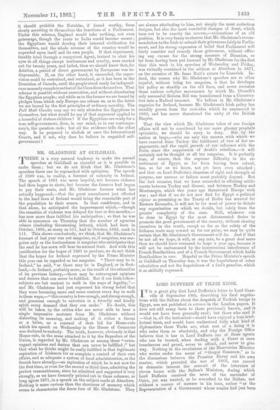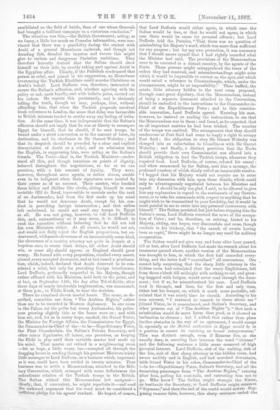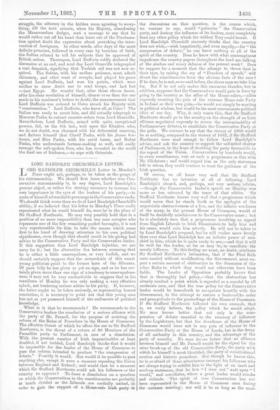LORD DUFFERIN AT YILDIZ KIOSK.
IT is a great pity that Lord Dufferin's letter to Lord Gran- ville of September 18th, describing his final negotia- tions with the Sultan about the despatch of Turkish troops to Egypt, was not published in extenso in the London papers. It does not add many facts to those previously known, and it, would not have been generally read ; but those who read it —that is, all the instructed—would have enjoyed a true intel- lectual treat, and would have understood fully what kind of diplomatists these Turks are, what sort of a being it is who rules them so absolutely, and why the Foreign Office believes that it has in Lord Dufferin one of those agents who can be trusted, when dealing with a Court at once treacherous and proud, never to offend, and never to give way. Nothing in the revelations of the Hanoverian Minister who writes under the name of "Gregor Samarow," as to the discussions between the Prussian Envoy and his own master, which preceded the war of 1866, can exceed in dramatic interest the accountof the interview of eleven hours with the Sultan's Ministers, during which Lord Dufferin received the news of the surrender of Cairo, yet was treated, as he remarked to the Sultan, not without a nuance of menace in Lis tone, rather "as the Representative of a Government whose armies had just been
annihilated on the field of battle, than of one whose Generals had brought a brilliant campaign to a victorious conclusion."
The situation was this,—the British Government, acting, as we fancy, a little too much on Consular information, were con- vinced that there was a possibility during the contest with Arabi of a general Mussulman outbreak, and though not dreading this, dreaded the impetus and excuse this might give to various and dangerous Christian ambitions. They therefore honestly desired that the Sultan should show himself on their side, by overtly taking part against Arabi in the Egyptian affair. Clearly, if the Padishah condemned that person as rebel, and joined in his suppression, no Mussulman reverencing the Turkish Khalifate could murder Christians on Arabi's behalf. Lord Dufferin was, therefore, instructed to secure the Sultan's adhesion, and, whether agreeing with the policy or not, most loyally, and with infinite pains, carried out his orders. He repeats this persistently, and is obviously telling the truth, though we may, perhaps, hint, without offending him, that when the Turkish proposals involved fresh references to London, the sense that delay was favourable to British interests tended to soothe away any feeling of irrita- tion. At the same time, it was indispensable that the Sultan's adhesion should not imply that he was at liberty to reconquer Egypt for himself, that he should, if he sent troops, be bound under a strict convention as to the amount of force, its destination, and its obedience to Sir Garnet Wolseley ; and that its despatch should be preceded by a clear and explicit denunciation of Arabi as a rebel, and an admission that the English, in suppressing him, were acting as the Sultan's friends. The Porte—that is, the Turkish Ministers—under- stood all this, and though tenacious on points of dignity, behaved throughout the negotiations, so far as we can perceive, with a fair amount of loyalty. They were, however, throughout mere agents, or rather slaves, unable even to be indignant when their signatures were treated by their owner as of no account. Their master, who hustled them hither and thither like clerks, Bitting himself in some invisible Mil de 13ceuf, inaccessible to mortals under the rank of an Ambassador, had from the first made up his mind that he would not denounce Arabi, except for his con- duct in provoking foreign intervention ; and that unless left unfettered, he would not send any troops to Egypt at all. He was not going, however, to tell Lord Dufforin this, and, extraordinary as it may seem, it is difficult to read the narrative without believing that he did not tell his own Ministers either. At all events, he would not act, and would not flatly reject the English propositions, but en- deavoured, with much cleverness of an inconceivably mean kind, the cleverness of a country attorney not quite in despair of a hopeless case, to create fresh delays, till either Arabi should win, or some ally should appear, or England should grow weary. He fenced with every proposition, recalled every assent, altered every accepted document, and at last issued a proclama- tion, which, indeed, declared that Arabi deserved to be con- sidered a rebel, but only for provoking foreign interference. Lord Dufferin, profoundly respectful to his Majesty, though rather offhand with his Ministers, held both to the point, and at last, on September 14th, the day after Tel-el-Kebir, after three days of nearly intolerable tergiversation, was summoned, at three p.m., to Yildiz Kiosk, to hear the decision.
There he remained eleven mortal hours. The scene, as de- scribed, resembles one from "The Arabian Nights," rather than one to be recorded in Western diplomacy. In one room in the Palace sat the polite but weary Ambassador, his polite- ness growing slightly thin as the hours wore on ; and with him sat, and, let us in mercy hope, smoked, the Grand Vizier, the Minister for Foreign Affairs, the Commissioner for Egypt, the Commander-in-Chief of the—to be—Expeditionary Force, the First Chamberlain, the Sultan's Private Secretary, and other minor dignitaries, all intent, one perceives, on keeping the Elchi in play until their invisible master had made up his mind. That master sat retired in a neighbouring room —let us hope, a little weary, too—occupied all through the dragging hours in sending through his greatest Ministers tricky little messages to Lord Dufferin, on a business which, important as it was, could have been settled in twenty minutes. That business was to settle a Memorandum, attached to the Mili- tary Convention, which arranged with some definiteness the subordinate relation of the Turkish troops to the British.
• The Sultan wished this Memorandum left unsigned— clearly, that, if convenient, he might repudiate-it—and' used the awkward argument that his word must be considered a 'saffloient pledge for his agents' conduct. He hoped, of course, that Lord Dufferin would either agree, in which case the Sultan would be free, or that he would not agree, in which case there would be cause for personal offence ; but Lord Dufferin told the Premier, "That there was no question of misdoubting his Majesty's word, which was more than sufficient for any purpose ; but for my own protection, it was necessary that I should assure myself that I had rightly recorded what the Minister had said. The provisions of the Memorandum were to be executed in a distant country, by the agents of the Porte. These persons might misapprehend the tenor of the orders they had received, and misunderstandings might arise which it would be impossible to correct on the spot, and which would entail a reference to Constantinople, which, under the circumstances, might be an impossibility. Thus baffled, the astute little attorney hidden in the next room, proposed, through some great dignitary, that the Memorandum, instead of being a separate document attached to the Convention, should be embodied in the instructions to the Commander-in- Chief of the Expeditionary Force ; and to this consider- able innovation, Lord Dufferin agreed. Knowing his man, however, he insisted on reading the instructions, to see that the Memorandum was in them • and found, as he expected, that on all important matters he had been tricked. The number of the troops was omitted. The arrangement that they should rendezvous at Port Said had come to imply a right to occupy Port Said ; the obligation to obey Sir Garnet Wolseley was changed into an exhortation do friendliness with Sir Garnet Wolseley ; and finally, a distinct provision that the Turks should provide their own Commissariat was altered into a British obligation to feed the Turkish troops, whenever they required food. Lord Dufferin, of course, refused his assent ; and when summoned by the Sultan, sent him a message, the profound courtesy of which thinly veiled an immovable resolve. "I begged that his Majesty would not require me to enter into any discussion with him upon these details which could only be advantageously negotiated between his Ministers and myself. I should be only too glad, I said, to be allowed to give him any explanation in regard to the sentiments of my Govern- ment, or to take his commands with respect to anything that he might wish to be transmitted to your Lordship, but it would be most painful to me to enter into any personal controversy with himself." The Sultan persisted, but just before stepping into the Sultan's room, Lord Dufferin received the news of the occupa- tion of Cairo ; and he, therefore, on retiring, hinted to his Majesty, sitting, one hopes, very disconsolate and cross, thosigh resolute in his trickery, that " the march of events having been so rapid," there might be no longer any need for military co-operation.
The Sultan would not give way, and hour after hour passed, till at last, after Lord Dufferin had made the remark about his treatment quoted above, [mother version of the Memorandum was brought to him, in which the first half conceded every- thing, and the latter half " neutralised " all concessions. One cannot help suspecting that the sharp little attorney in the hidden room had calculated that the weary Englishman, left from three o'clock till midnight with nothing to eat, and grow- ing haggard with fatigue, would never read through the docu- ment; but if so, he misunderstood his man, Lord Dufferin read it through, and then, for the first and only time, either lost his temper, or, which is much more probable, cal- culated that it was nearly time he should. According to his own account, "I ventured to remark to those about me" (Grand Vizier, be it remembered, and Sultan's Secretary, and other persons out of "The Arabian Nights ''), "that such a substitution would do more harm than good, as it showed an inclination to chicane ; but I added, that rather than place further obstacles in the way of an agreement, I would accept it, especially as the British authorities in Egypt would be in a position to ensure its receiving an honest interpretation." This was distinct enough, even if Rumour lies, as she usually does, in assorting that between the word "chicane " and the following sentence a little scene occurred of high pictorial interest. Lord Dufferin, sick of the waiting, sick of the lies, siok of that sharp attorney in the hidden room, had sworn audibly and in English, and had marched downstairs, with Grand Vizier in his robes, Clommender-in-Chief of the —to be—Expeditionary Force, Sultan's Secretary, and all the remaining personages from " The Arabian Nights," running after him, pulling his coat-tails, and entreating him not to go. Who knew ? The Sultan might strangle the Vizier, or bastinado the Secretary, or Lord Dufferin might summon "Seymour," and then the end of the world would arrive. Sup- posing rumour false, however, this sharp sentence ended th"
struggle, the attorney in the hidden room agreeing to every- thing, till the next minute, when his Majesty, abandoning the Memorandum dodges, sent a message to say that he would rather out off his hand than leave out of the Proclama- tion against Arabi the expression about provoking the inter- vention of foreigners. In other words, after days of the most definite promises, followed in every case by breaches of faith, the Sultan refused to tell his subjects that he approved of British action. Thereupon, Lord Dufferin coldly declared the discussion at an end, and next day Lord Granville telegraphed a curt despatch, signifying that Turkish aid was not now re- qtired. The Sultan, with his endless patience, most adroit chicanery, and utter want of scruple, had played his game against Lord Dufferin, had won his points, which were neither to curse Arabi nor to send troops, and had lost —just Egypt. No wonder that, after those eleven hours, after his clear revelation of himself, clearer even than the one made in his confessor's letters to Arabi, the announcement that Lord Dufferin was ordered to Cairo struck his Majesty with "consternation." Lord Dufferin, who knew all, at Cairo! The Sultan was ready to arrest him, and did actually telegraph to Musurus Pasha to extract counter-orders from Lord Granville. Nevertheless, Lord Dufferin, armed with quite exceptional powers, did, on the 8th inst., wait upon the Khedive, who, we do not doubt, was charmed with his deferential courtesy, and flatters himself that Cherif Pasha, with his fame bon- homie, and Riaz Pasha, with his acrid hates, and Nubar Pasha, who understands fortune-making so well, will easily manage the soft-spoken Peer, who has revealed to the world the final use of Irishmen,—to cope with Orientals.








































 Previous page
Previous page